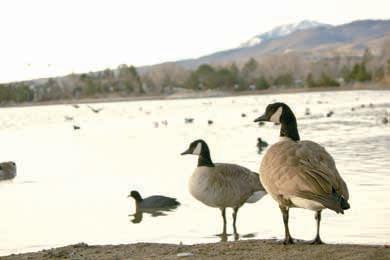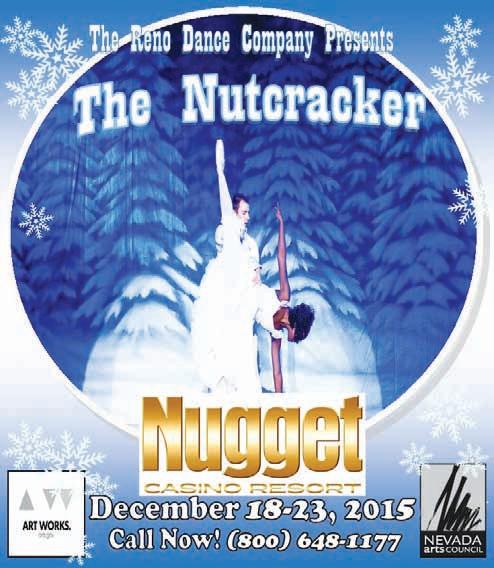
3 minute read
Green
from Dec. 17, 2015
PHOTO/KELSEY FITZGERALD
Soon to be counted: Canada geese at Virginia Lake.
Advertisement
Duck, duck, goose
Birders gather for 116th annual bird count Pictures With Santa
On a chilly December morning at Virginia Lake, hundreds of Canada geese and mallards honked and quacked as they moved slowly along the shoreline, by intermixed with lesser numbers of American coots. A flock of noisy Kelsey ring-billed gulls circled overhead, and further out, a group of ruddy ducks
Fitzgerald headed toward the south shore. Near the roadside, 77 pigeons sat on a telephone wire, evenly spaced (and temporarily easy to count). A man walked by tossing breadcrumbs, and chaos ensued. To accurately count all of the birds at Virginia Lake, much less the entire Truckee Meadows region, would no doubt be a challenging task— but on Dec. 19, local birdwatchers will join forces to do just that, as part of the National Audubon Society’s 116th annual Christmas Bird Count. “The Christmas Bird Count is a great example of what is called citizen science, where a lot of data is being collected by people that are amateurs, but it’s being consistently reported, and scientists are beginning to use that data,” said Kathy Oakes, communications chair for the Lahontan Audubon Society, the local chapter of the National Audubon Society. Each year, volunteers across the Americas, the Caribbean and Pacific Islands gather during the holiday season to participate in these counts. Counts can happen anywhere that a volunteer organizes a “count circle,” a 15-mile diameter circle with at least 10 willing birdwatchers. Most counts do not actually occur on Christmas day, but take place during one 24-hour period between Dec. 14 and Jan. 5. Data from the counts have been used in hundreds of studies, including the National Audubon Society’s 2014 Climate Change Report, in which
For information on was reported that 314 species, or nearly half of the bird species in North local Christmas Bird America, will be severely threatened by habitat changes associated with
Counts and how to global warming.participate, visit the Lahontan Audubon Society’s page at: The Christmas Bird Count began in 1900 as an alternative to the traditional Christmas “side hunt,” in which people would head out into the wild www.nevadaaudubon. to shoot as many birds as they could. Though the first Truckee Meadows org/christmas-bird- count circle wasn’t organized until 1963, volunteers have now gathered counts.html more than 50 years of valuable data on local bird populations. “In 1963, they saw 49 species, and 2,700 individual birds,” Oakes said.
For information on “There were four participants in that count. Last year, 26 participants saw 121 the history of the species and over 27,000 birds, just within the Truckee Meadows. The [locaChristmas Bird Count tion of] the count circle doesn’t change and you only count for the one day, or results from previous years, visit the National Audubon so it gives you kind of a picture of what an area looks like in time.” Because more people can generally find more birds, Audubon also Society page at: records the number of people who participate each year, how much time www.audubon.org/ they put in, and other information that can affect the count.conservation/science/ christmas-bird-count In the Truckee Meadows, data from the Christmas Bird Count show changes that have occurred as land use patterns have shifted. Pigeons, for example, are a relatively new arrival. “The first pigeon recorded in Reno was 1974 in the Christmas Bird Count, because it was so much more rural then. Now they’re all over,” Oakes said. The Lahontan Audubon Society welcomes all participants, regardless of experience level, to the Truckee Meadows Christmas Bird Count on the 19th, said Oakes. Other local counts will occur in Carson City (Dec. 20), Pyramid Lake (Jan. 1), and Minden (Jan. 2). Ω
Visit Shoppers Square Winter Wonderland and discover that special gift.











